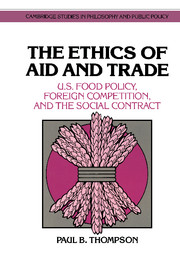Book contents
- Frontmatter
- Contents
- Acknowledgments
- Introduction: Of cabbages and kings
- 1 The food weapon and the strategic concept of food policy
- 2 The Bumpers Amendment
- 3 Does helping foreign industries violate a basic principle of government?
- 4 International agricultural assistance and the interests of U.S. agriculture
- 5 The trading state and the social contract
- 6 Humanitarianism, hunger, and moral theory
- 7 Morality and the myth of scarcity
- 8 The time has come, the walrus said, to speak of many things
- Notes
- References
- Index
5 - The trading state and the social contract
Published online by Cambridge University Press: 20 May 2010
- Frontmatter
- Contents
- Acknowledgments
- Introduction: Of cabbages and kings
- 1 The food weapon and the strategic concept of food policy
- 2 The Bumpers Amendment
- 3 Does helping foreign industries violate a basic principle of government?
- 4 International agricultural assistance and the interests of U.S. agriculture
- 5 The trading state and the social contract
- 6 Humanitarianism, hunger, and moral theory
- 7 Morality and the myth of scarcity
- 8 The time has come, the walrus said, to speak of many things
- Notes
- References
- Index
Summary
Since Hobbes (1651), social contract theories have presumed that individuals unbound by obligations and constraints of government would, or rationally should, abandon some personal liberties in exchange for certain guarantees and benefits that can be secured only by enforceable schemes of mutual cooperation. The philosophical basis for competitiveness sentiments can be found in the implicit themes of the social contract argument. Contract theorists make the implicit assumption that benefits accrue primarily to contracting parties. Rational self-interest is the primary motivation for entering the social contract, so the benefits of entering the contract must outweigh the costs for each individual. One can imagine situations in which external effects of the contract benefit third parties, but the Bumpers case involves intentional action to benefit foreigners at the expense of citizens. Although the state's responsibility to protect economic interests from foreign threats is uncertain, the social contract cannot plausibly be understood to permit state intervention on behalf of foreign competitors unless significant state interests are at stake.
The plausibility of social contract arguments in political theory comes from their analogy to standard personal contracts in which parties consent to be bound by terms and conditions. The presumption is that parties so agree because they perceive a mutual benefit in making the contract. There may, to be sure, be cases where parties contract for services that will benefit others indirectly, as when the services one contracts from a house painter so beautify the neighborhood that others reap aesthetic benefits, or even increased property values.
- Type
- Chapter
- Information
- The Ethics of Aid and TradeU.S. Food Policy, Foreign Competition, and the Social Contract, pp. 98 - 125Publisher: Cambridge University PressPrint publication year: 1992

